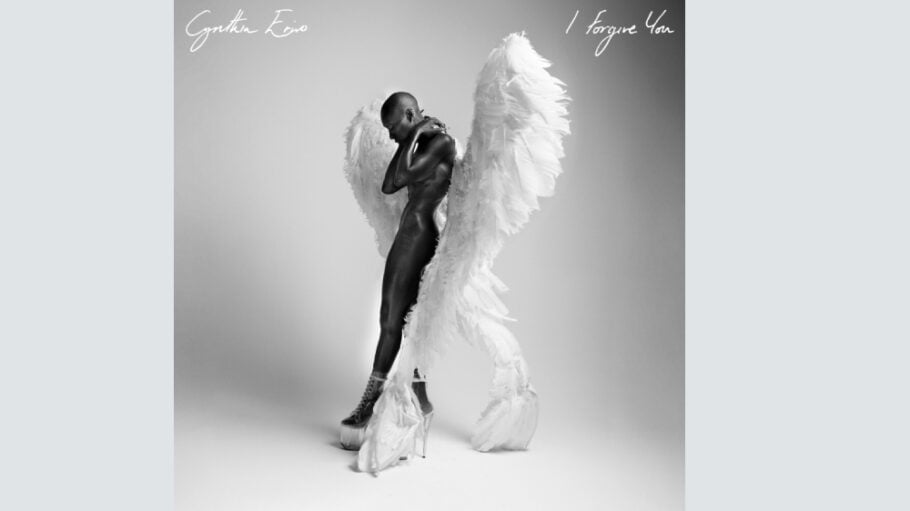The queen of “Defying Gravity” engages in a high level of expectation defiance on “I Forgive You,” her exemplary second album as a singer-songwriter and first release since “Wicked” firmly established her as a universal household name. For those who weren’t keeping track when she released her first solo effort, 2021’s “Ch. 1 Vs. 1,” there will be some surprises in how she veers off anything like a beaten path when it comes to putative crossover.
Because Erivo is a Black woman with a powerful voice who did, after all, portray Aretha Franklin, there might be an expectation she’ll be making an R&B record, throwback or otherwise. That’s busted stereotype No. 1. While “I Forgive You” does have a kind of contemporary R&B stretch to it midway through, in totality, it’s closer to being a grandly moody Hozier record than it is just about anything else. Stereotype No. 2: As a musical theater actress, she will be belting, right? Not so much — those coming to this album for Elphabian war cries have come to the wrong place. That would explain why “Wicked”-heads may have felt a little let down when she released the first single, “Replay.” Hearing that, show-tune-hardened listeners may have wondered: If she’s going to pursue a pop career and not give us a cascading series of octave lifts, but instead serve up a singsongy number about anxiety that sounds a little like “Tom’s Diner,” isn’t that like having a Ferrari and not taking it out of third gear?
Rest assured, there is a lot of shifting into fourth and fifth over the 20-song course of “I Forgive You”; it just doesn’t have to do with showing off her prowess with hyperdramatic key changes. She’s a model of vocal restraint across much of this album — which is not in itself a virtue, but Erivo sure makes it one, finding extravagant colorings in tunes that refuse to hit you over the head with either a broomstick or a coloratura. Some of the most impressive passages have her stacking her voice for an eerily ear-tickling choral effect, against modest instrumentation or a 30-piece orchestra or rendered a cappella. Sometimes, multiple Cynthias softly coo in the foreground while a wailing Erivo comes up from the rear. If it’s not what multitracking was invented for, it’s an awfully effective use of manual labor, and crafty layering, in the studio.
What’s maybe most unexpected, though, is the strengths Erivo brings as a lyricist, conceptualist and even a song sequencer. Working with primary collaborator Will Wells, the singer has broken the album into four thematic sections, with distinct demarcations that it doesn’t hurt to have some awareness of going in, or at least passing through. The first six songs serve more or less as their own breakup EP, with Erivo clearheadedly surveying a relationship she’s just ended, or is about to, with some fairly emotionally complex numbers about the mixed feelings of culpability and liberation that come with being the one to end something. Just when it seems as if the entire album might be a bracingly honest and confessional document of a romantic split, the second part offers a sudden diversion into the aforementioned R&B section, and we get a very different Erivo: This is sexy time, and a suitable soundtrack for probably anyone’s immediate sensual soundtrack needs… as long as you remember to start it up after those first six downbeat numbers.
After that extended sensual interlude, there’s another departure to follow, as part three of the album is both headier and flightier, using lighter pop flourishes to describe a love that’s more spiritual. And the final stretch eschews romantic concerns altogether to look at larger life issues. This end run wraps up with “Grace,” a deeply sentimental testament memorializing a little girl Erivo made a connection with whose last big wish was to see a preview of “Wicked.” (The actual girl’s voice heartrendingly closes the album.)
That’s a lot of pent-up territory to cover, and Erivo does it like she’s been writing and recording albums her whole career, not just succeeding a decent debut with a much more ambitious and accomplished follow-up. Will it be a smash? Not likely, but this four-part album hasn’t been conceived as a four-quadrant blockbuster. It exists in a rarefied place between pop and modern musical theater, and maybe the highest praise you could give it is to note that if, God forbid, Stephen Schwartz had been taken out before “Wicked: For Good,” you can imagine Erivo and Wells possibly being up to the task of coming up with the requisite new song. She’s not in Schwartz territory yet, and that’s not exactly what she’s going for with these strong, low-key relationship songs. But from the results here, you wouldn’t want to put it past Erivo that she might co-write her own musical someday, and that this would be an opening night to remember.
From Variety US
Love Film & TV?
Get your daily dose of everything happening in music, film and TV in Australia and abroad.































